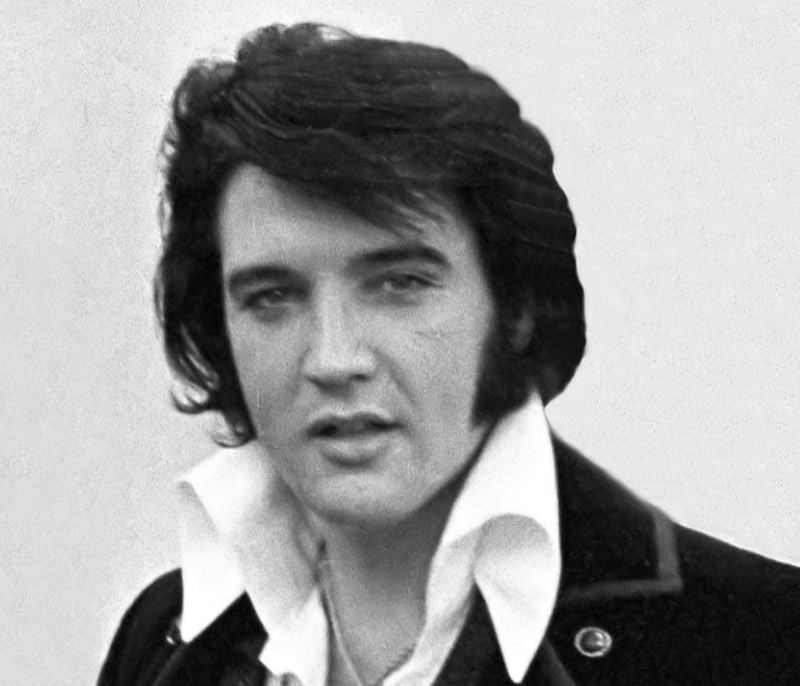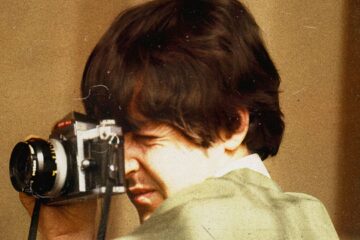Today, August 16th 2020, marks 43 years the world has been without Elvis Presley, the King of Rock and Roll and a musician whose voice—and hips—did the talking.
The singer, often regarded as one of the most most significant cultural icons of the 20th century, recorded 23 studio albums in a fast and furious career which ended far too soon.
Elvis’ influence knows no bounds, his approach to music creation has significantly impacted the way in which we engage with sound and, more poignantly, influenced those who are most famous for the artform. “The first time I saw Elvis, singing from a flatbed truck at a Katz drugstore opening on Lamar Avenue, two or three hundred people, mostly teenage girls, had come out to see him,” the great Johnny Cash once remembered of his contemporary. “With just one single to his credit, he sang those two songs over and over. That’s the first time I met him. Vivian and I went up to him after the show, and he invited us to his next date at the Eagle’s Nest, a club promoted by Sleepy-Eyed John, the disc jockey who’d taken his name from the Merle Travis song and was just as important as Dewey Phillips in getting Sun music out to the world.”
Adding: “I remember Elvis’ show at the Eagle’s Nest as if were yesterday. The date was a blunder, because the place was an adult club where teenagers weren’t welcome, and so Vivian and I were two of only a dozen or so patrons, fifteen at the most. All the same, I thought Elvis was great. He sang That’s All Right, Mama and Blue Moon of Kentucky once again (and again) plus some black blues songs and a few numbers like Long Tall Sally, and he didn’t say much. He didn’t have to, of course; his charisma alone kept everyone’s attention. The thing I really noticed that night, though, was his guitar playing. Elvis was a fabulous rhythm player.”
Tragically though, a prolonged period of time as the most famous man on the planet had taken its toll on Elvis. As his personal life began to crumble around him, his divorce to Priscilla Beaulieu was confirmed in 1973 and his reliance on drug addiction began to take hold. After a number of overdoses ultimately led to Presley being hospitalised and, ultimately, ending up in a coma, it was clear that the path the iconic musician was on was a destructive one.
After three years of turbulent substance abuse and personal issues, Elvis was in a worrying state. Journalist Tony Scherman wrote that by early 1977, “Presley had become a grotesque caricature of his sleek, energetic former self. Hugely overweight, his mind dulled by the pharmacopia he daily ingested, he was barely able to pull himself through his abbreviated concerts.” It was obvious that the singer was in a terrible state.
However, despite his serious issues, Elvis continued to perform live with stringent determination and, on June 26th, 1977, he would step onto the stage for the final time as he appeared in front of 18,000 fans at Indianapolis’ Market Square Arena.
Presley would tragically die just over six weeks on from his final concert and the year leading up to be the Market Square Arena show were traumatic, to say the least. The King, battling personal issues, would end up allowing said problems to bleed their way into his live performances. Journalist Scherman recounted watching one of his final concerts in Alexandria, Louisiana, where he was on stage for less than an hour and “was impossible to understand”.
Elvis managed to put his problems aside for his final ever performance and bowed out in euphoric fashion. Although in true rockstar fashion, he didn’t arrive on stage until 10pm even though his stage time was an hour-and-a-half before with warm-up acts of brass bands, soul singers, and a comedian filled time before the King’s took to his throne.
His set lasted for around 80 minutes, it saw Elvis fly through classics such as ‘Jailhouse Rock’ and ‘Hound Dog’ as well as a poignant cover of Simon & Garfunkel’s Bridge over Troubled Water’ before closing the concert in beautiful fashion with ‘Can’t Help Falling in Love with You’. It would prove to be his last ever song.



